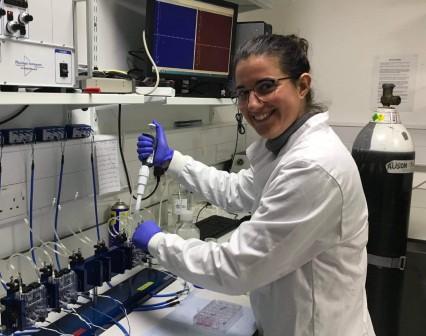Finding new ways to treat everyone with CF: an acid test for researchers
An important part of keeping the lungs healthy is to keep them well-hydrated and clear of infections. One way to do this is by ensuring the correct acid-alkali balance (correct pH) of the mucus that lines the surface of the lungs.
In people with CF, the mucus becomes too acidic; in turn, this increases its stickiness and prevents bugs trapped in the mucus from being removed or killed. Correcting the mucus back to an alkaline solution (alkaline pH) could be an effective way to treat CF.
Team dynamics of healthy lungs
The CF protein is involved in keeping the lungs healthy and in balancing the acidity of the mucus. However, the CF protein doesn’t do this on its own. It works very closely with other proteins on the surface of the lungs, too.
Just as players in a football or rugby team work together during a match, each having their own specialties but equally able to cover for each other at different times, the same is true for the proteins on the surface of the lungs. Understanding the complex ‘team dynamics’ of how these proteins work together could lead to new ways to treat CF, particularly for people with Class 1 type of CF mutations that are not able to benefit from CFTR modulator medicines such as Kaftrio.
Newcastle-based researchers Dr Livia Delpiano and Dr Mike Gray, working on one of the Trust’s Strategic Research Centres (SRCs), looked at what happens to the acid-alkali balance of mucus when the CF protein isn’t made and whether they could improve the health of lung cells in the lab. This work was done in collaboration with researchers from Professor Jeff Beekman’s lab at University Medical Centre Utrecht in the Netherlands, who were also co-investigators in the same SRC.
Studying cells from people with rare CF mutations
The researchers used cells collected from the noses of people with CF who had rare ‘Class 1’ mutations and studied them in the lab. People with Class 1 CF mutations don’t make any CF protein, and they are not able to benefit from medicines such as Kaftrio.
In particular, they looked at two other proteins that work on the surface of the lungs called ‘SLC26A4’ and ‘TMEM16A’. (Like the CF protein – the full names of these proteins are so long, they are only ever referred to as their abbreviations!). They used genetic engineering to inactivate or ‘switch off’ each of these proteins in turn and looked at what happened to the acidity levels of mucus.
Studying what each protein did on its own meant the researchers could track its contribution to the team dynamics. (Like the clever tech they use on the screens, in the post-match analysis on TV sports broadcasts, to track a particular player’s role in the action!).
They found that both TMEM16A and SLC26A4 proteins are definitely involved in balancing the right acid/alkali levels. The researchers also showed that adding existing medicines, licenced for other conditions, improved the alkalinity of the mucus layer.

“It’s really hard to study pH in the lab, as it changes in an instant” said Dr Livia Delpiano who conducted these studies. “A former colleague Dr Vinciane Saint-Criq, who was also funded by Cystic Fibrosis Trust, developed an easy-to-use and robust way of studying the pH of cells, and I used this method for our new studies. I’m really pleased to be able to build on her success in this way, and I hope that future CF researchers can build the next steps from my research too.”
For those people with CF who currently have no effective therapies (between 10-15% people with CF worldwide), there is a real unmet need to find ‘alternative’ treatments. Substantial evidence shows that when the airways become more acidic (the pH is lowered), the lungs are predisposed to both bacterial and viral infections. Our work provides proof of principle that there are transporters that can help restore this pH imbalance, not only for this group of people with CF, but for all people with CF independent of which form of CF they have.
Dr Mike Gray, SRC principal investigator and senior author of the study
To read more about these research studies you can read the research paper published in November 2023: Delpiano et al Proc Natl Acad Sci U S A. 2023 Nov 21;120(47):e2307551120. doi: 10.1073/pnas.2307551120
Past research, funded by our incredible supporters, has transformed the lives for many in our community. We’ve made some incredible progress. But we still have so much to do.
Will you donate today to help fund more CF research and help change more lives?
